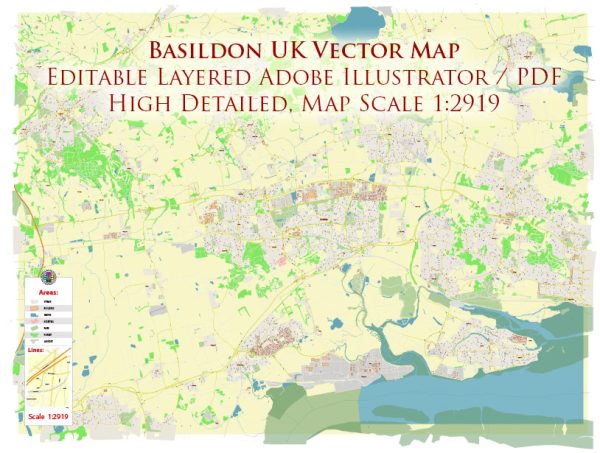Basildon is a town in Essex, England, and its economic history is closely tied to broader trends in the UK’s economic development.
Vectormap.Net provide you with the most accurate and up-to-date vector maps in Adobe Illustrator, PDF and other formats, designed for editing and printing. Please read the vector map descriptions carefully.
Here’s a brief overview of the economic history of Basildon:
- Agricultural Origins (Pre-20th Century): Like many towns in the United Kingdom, Basildon has ancient roots, and its early economy was primarily based on agriculture. The region was characterized by small-scale farming, and the local economy was influenced by the agricultural cycles.
- Post-World War II Era (1940s-1950s): The modern economic history of Basildon is closely linked to the post-World War II period. After the war, the UK faced significant housing shortages and urban overcrowding. In response, the government implemented ambitious plans for new towns to accommodate the growing population and promote economic development. Basildon was designated as one of these new towns in 1949.
- Industrialization and Urbanization (1960s-1970s): Basildon experienced rapid industrialization and urbanization during the 1960s and 1970s. The government’s new town development plan aimed to create a balanced economy, attracting a mix of industries to the area. Companies from various sectors, including manufacturing and services, set up operations in Basildon, contributing to job creation and economic growth.
- Manufacturing and Employment: Manufacturing played a significant role in Basildon’s early economic development. The town attracted companies involved in industries such as engineering, electronics, and automotive manufacturing. Ford, for example, established a major presence in Basildon with its tractor plant. The manufacturing sector provided a substantial number of jobs and contributed to the town’s prosperity.
- Diversification and Service Sector Growth (1980s-Present): Over the years, Basildon has undergone economic diversification, with a shift from heavy industry to a more varied economic base. The service sector, including retail, education, and healthcare, has become increasingly important. Basildon is home to a number of shopping centers and business parks, fostering commercial and service-oriented activities.
- Challenges and Changes: Like many post-industrial towns, Basildon has faced economic challenges, including the decline of traditional industries. The restructuring of the manufacturing sector, globalization, and technological advancements have led to changes in the local economy. Efforts have been made to adapt and attract new businesses to ensure sustained economic growth.
- Infrastructure Development: Basildon’s economic history is also influenced by infrastructure development. Transportation improvements, including the construction of roads and railway connections, have facilitated the movement of goods and people, contributing to the town’s economic connectivity.
- Housing and Population Growth: The original purpose of creating Basildon as a new town was to address housing shortages. The growth in population, fueled by the influx of residents attracted by job opportunities, has had a significant impact on the local economy, influencing demand for goods and services.
In summary, Basildon’s economic history reflects the broader patterns of post-war urban development in the UK. It started as an agricultural area and evolved into a thriving new town with a diverse economic base, experiencing shifts in industry and employment over the decades. Today, Basildon continues to adapt to economic changes and strives to maintain its role as a dynamic and economically viable community.


 Author: Kirill Shrayber, Ph.D. FRGS
Author: Kirill Shrayber, Ph.D. FRGS